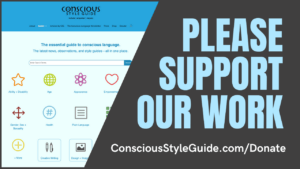From the World of Conscious Language
“Employers seem to rarely consider fat people when putting together their Diversity, Equity and Inclusion goals. But creating a space for plus-size employees to feel welcome has just as much to do with diversity and inclusion as any other group.”
“A 2018 study found that during exercise, people reported more positive emotions and higher body satisfaction if their instructors made motivational comments focused on strength rather than losing weight or changing their appearance. Translation: An instructor that hypes you up makes you feel way better than one that tears you down.”
“The clean girl aesthetic, rigorously being pushed on TikTok and Reels, actually sets unattainable beauty standards for most people, especially the young, dealing with hormone imbalance.”
“Y’all,” That Most Southern of Southernisms, Is Going Mainstream—and It’s About Time | The Conversation
““You” can be both singular and plural, but it’s sometimes awkward to use as a plural…‘Y’all’ fills that second person plural slot—as does ‘you guys,’ ‘youse,’ ‘you-uns’ and a few others.”
Muslim Representation in the Media Must Be Improved | High School Insider
“Muslims portrayals are often associated with terrorism or violence…Clearly, this representation of Muslims is extremely harmful, dangerous, and quite ironic, as the religion is actually one that promotes peace.”
Both-Sidesing the Climate Story | Columbia Journalism Review
“It is maddening that, this far into the climate crisis, news outlets continue to dither as to whether a single weather event is related to the now-undeniable, violent changes in Earth’s weather.”

Girl Guides of Canada Drops Brownies Name | The New York Times
“Continuing to use a name that we have been directly told by girls has caused them harm would go against everything that we stand for as an organization.”—Girl Guides of Canada
What Exactly Is “Neurodiversity”? Using Accurate Language About Disability Matters in Schools | The Conversation
“Neurodiversity, originating in the autism community, reflects the notion that all ‘bodyminds’ work in diverse ways.”
“‘Enby’, short for someone who is non-binary, was also added, along with ‘gender-affirming’…an adjective that ‘validates or confirms a person’s gender’ and ‘enables a person, especially a transgender person, to live according to their gender identity’.”
Reviled, Reclaimed and Respected: The History of the Word “Queer” | The Conversation
“It could be said that liberating words from non-affirming religious, clinical or colloquial contexts and giving them our own meanings is one of the defining characteristics of LGBTIQA+ history.”
“The lack of knowledge of LGBTQ+ terms in Welsh means when people use ‘nhw’ [a gender-neutral personal pronoun] sometimes they are unable to be understood, according to Rowan Gulliver, a 22-year-old teacher in Barry, Vale of Glamorgan.”
Old “They,” New “They”—Language Change in Action | Quick and Dirty Tips
“The Chicago Manual of Style, the MLA, and the APA style guides all say it’s absolutely fine to use ‘they’ for a person if that person uses they/them pronouns. In fact, the Trans Journalists Association has its own style guide that gives the most up-to-date guidance: ‘They/them pronouns are not new and should not require an explanation for audiences. […] The media has been reporting regularly on singular they/them pronouns in relation to trans people for at least a decade, and these pronouns are in the dictionary.’”
How to Describe Characters | Mythcreants
“We’re told that leaving description out is bad, but doing it wrong seems even worse. How do we write respectable description that tells readers what they need to know, isn’t embarrassingly awkward, and doesn’t make anyone feel objectified or stigmatized?”
From the Archives
Breaking Up With Words | By Karen Yin, Conscious Style Guide
“Form relationships with new words. Aim for equality and not just diversity. We need to evolve language so that more of us matter.”
In Case You Missed It
Rejecting person-first language, explaining autism to kids, and eliminating exclusionary language at work.
The Conscious Style Guide newsletter rounds up the best news and blog posts from the world of kind, compassionate, mindful, empowering, respectful, and inclusive language. Note: Spotlighting an opinion is not intended as an endorsement. Please send news tips to [email protected].
The post The Conscious Language Newsletter: January 2023 appeared first on Conscious Style Guide.
